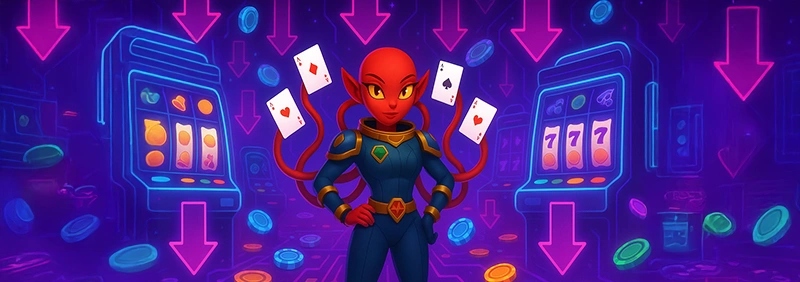Home > Casino Lab > Science of Slots > The Myth of Losing Streaks: Why Past Spins Don’t Predict Future Wins
The Myth of Losing Streaks: Why Past Spins Don’t Predict Future Wins
One of the most common misconceptions in gambling is the belief that after a long losing streak, a win is “due.” Many players sit at a slot machine or roulette table convinced that their luck is about to turn simply because they have endured several losses in a row.
This belief, known as the gambler’s fallacy, is deeply rooted in psychology but completely disconnected from the reality of how casino games work. In truth, every spin, roll, or card draw is independent, driven by Random Number Generators (RNGs) that erase the influence of past outcomes.

Understanding the Gambler’s Fallacy
The gambler’s fallacy is the mistaken assumption that past events influence future probabilities in independent games of chance. For example, if a roulette wheel lands on black ten times in a row, many players believe red is more likely to appear next. The same logic is applied to slot machines: after a series of losses, players think the machine “owes” them a win.
In reality, each spin of a slot or each spin of the wheel is statistically independent. The odds remain identical regardless of previous outcomes. RNG technology ensures that every event is random and uninfluenced by history, no matter how improbable a sequence might look.
Why Losing Streaks Happen
Losing streaks are a natural part of gambling because of the way probabilities work. In games with a house edge, the likelihood of losing is always slightly greater than winning. Over time, this creates stretches of consecutive losses that may feel unfair but are mathematically expected.
Consider a slot machine with a 30% chance of paying out on any spin. That still means there is a 70% chance of losing. It is not only possible but inevitable that a player will sometimes lose multiple times in a row. These streaks are not a sign that the game is “rigged” or preparing for a payout—they are simply the statistical reality of randomness.
How Belief in Streaks Affects Player Behavior
Believing in the myth of streaks can lead to risky behaviors. Some players chase losses, increasing their bets after each spin, hoping that a win will balance out the streak. Others may stay at a machine far longer than planned, convinced that a jackpot is just around the corner. Both strategies are dangerous because they ignore the fundamental truth: the outcome of the next spin is no more predictable than the last.
Casinos profit from these misconceptions, as players often wager more when they believe they are “close” to a win. Recognizing this psychological trap is the first step to playing responsibly.
The Role of RNGs in Breaking the Myth
Random Number Generators play a central role in debunking the myth of losing streaks. Because RNGs operate continuously, producing thousands of random outcomes per second, no sequence has any bearing on what comes next. Whether you have just lost 20 spins in a row or hit a big win, the odds of the next spin remain exactly the same.
This independence is what guarantees fairness and unpredictability, but it also highlights why chasing streaks is a flawed strategy.
Conclusion
The idea that losing streaks predict future wins is nothing more than a psychological illusion. Known as the gambler’s fallacy, this belief leads players to overestimate their chances and often to gamble irresponsibly. In reality, every spin is independent, every outcome random, and no sequence guarantees what comes next.
The smartest gamblers are those who understand the myth, respect the mathematics, and play for entertainment rather than chasing an imaginary turning point.

